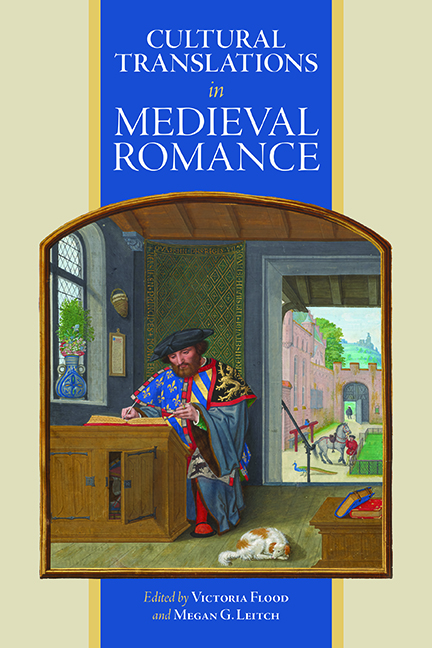Book contents
- Frontmatter
- Contents
- List of Contributors
- List of Abbreviations
- Introduction Insular Romance in Translation: New Approaches
- 1 Romantic Wales: Imagining Wales in Medieval Insular Romance
- 2 ‘Something remains which is not open to my understanding’: Enigmatic Marvels in Welsh Otherworld Narratives and Latin Arthurian Romance
- 3 The Supernatural Company in Cultural Translation: Dafydd ap Gwilym and the Roman de la Rose Tradition
- 4 Women and Werewolves: William of Palerne in Three Cultures
- 5 ‘Better a valiant squire than a cowardly knight’: Gender in Guruns strengleikr (The Lay of Gurun)
- 6 ‘Vinegar upon Nitre’? Walter Map’s Romance of ‘Sadius and Galo’
- 7 The Three Barriers to Closure in Hue de Rotelande’s Ipomedon and the Middle English Translations
- 8 Trojan Trash? The Seege or Batayle of Troye and the Learning of ‘Popular’ Romance
- 9 Poaching Romance: Fan Fiction Theory and Shared Medieval Narratives
- 10 Between Epic and Romance: The Matter of England and the Chansons de Geste
- 11 Geographies of Loss: Cilician Armenia and the Prose Romance of Melusine
- 12 ‘All this will not comfort me’: Romancing the Ballad in The Squire of Low Degree
- 13 Merchants in Shining Armour: Chivalrous Interventions and Social Mobility in Late Middle English Romance
- Index of Manuscripts
- General Index
- Miscellaneous Endmatter
3 - The Supernatural Company in Cultural Translation: Dafydd ap Gwilym and the Roman de la Rose Tradition
Published online by Cambridge University Press: 07 October 2022
- Frontmatter
- Contents
- List of Contributors
- List of Abbreviations
- Introduction Insular Romance in Translation: New Approaches
- 1 Romantic Wales: Imagining Wales in Medieval Insular Romance
- 2 ‘Something remains which is not open to my understanding’: Enigmatic Marvels in Welsh Otherworld Narratives and Latin Arthurian Romance
- 3 The Supernatural Company in Cultural Translation: Dafydd ap Gwilym and the Roman de la Rose Tradition
- 4 Women and Werewolves: William of Palerne in Three Cultures
- 5 ‘Better a valiant squire than a cowardly knight’: Gender in Guruns strengleikr (The Lay of Gurun)
- 6 ‘Vinegar upon Nitre’? Walter Map’s Romance of ‘Sadius and Galo’
- 7 The Three Barriers to Closure in Hue de Rotelande’s Ipomedon and the Middle English Translations
- 8 Trojan Trash? The Seege or Batayle of Troye and the Learning of ‘Popular’ Romance
- 9 Poaching Romance: Fan Fiction Theory and Shared Medieval Narratives
- 10 Between Epic and Romance: The Matter of England and the Chansons de Geste
- 11 Geographies of Loss: Cilician Armenia and the Prose Romance of Melusine
- 12 ‘All this will not comfort me’: Romancing the Ballad in The Squire of Low Degree
- 13 Merchants in Shining Armour: Chivalrous Interventions and Social Mobility in Late Middle English Romance
- Index of Manuscripts
- General Index
- Miscellaneous Endmatter
Summary
This chapter frames a new response to the Celtic source hypothesis long, and problematically, applied to the fairies of English and French romance. As Richard Firth Green notes, ‘Fairies are to be found from Iceland to Sicily and from the Pyrenees to the Ruhr, but the notion that Wales, Scotland and Ireland have a particular claim on them is deeply ingrained in the English speaking world.’ The particular Welsh associations of King Arthur, and the later fairy narratives associated with Avalon, may well have played a part in the persistence of this assumption – although, as I have argued elsewhere, the addition of the fairy narrative to the Avalon legend is most likely to have been an English and Continental innovation. The perception has also almost certainly been fuelled by the long legacy of an English nineteenth-century critical conflation of magic, nature, and a monolithic conception of ‘Celtic culture’, a framework into which the fairies of the Anglo-Continental tradition have been all too often inserted by twentieth-and twenty-first-century scholars of romance.
The course of analysis pursued in this chapter suggests a new approach, exploring what the supernatural imaginings of late medieval Welsh poetry might owe to romance paradigms, rather than vice versa. Its central argument is rooted in the cultural specificity of Welsh representations of the supernatural company, which operate in a marked contrast to the fairies of English and French romance – a distinction that is nowhere so clear as when Welsh authors engage with the cultural cues of romance.Taking as its focus the cywyddau serch (love poems) of Dafydd ap Gwilym (c. 1315–50), it explores Dafydd's reimagining of the supernaturalised court of Love, and the garden of Pleasure, of Guillaume de Lorris's Roman de la Rose (c. 1230). It considers the ways in which Dafydd overlays Guillaume's mythology of love with Welsh legendary and cultural frameworks, drawing on the precedent of the noble household in Wales in the generations following the Edwardian conquest of 1282–83. I approach this topic as a discrete chapter in the relationship between the Roman and other vernacular literary cultures of the late Middle Ages, and understand Dafydd's use of the Roman, or related traditions, as a movement we might place alongside that of his English counterpart, Geoffrey Chaucer.
- Type
- Chapter
- Information
- Cultural Translations in Medieval Romance , pp. 65 - 84Publisher: Boydell & BrewerPrint publication year: 2022



